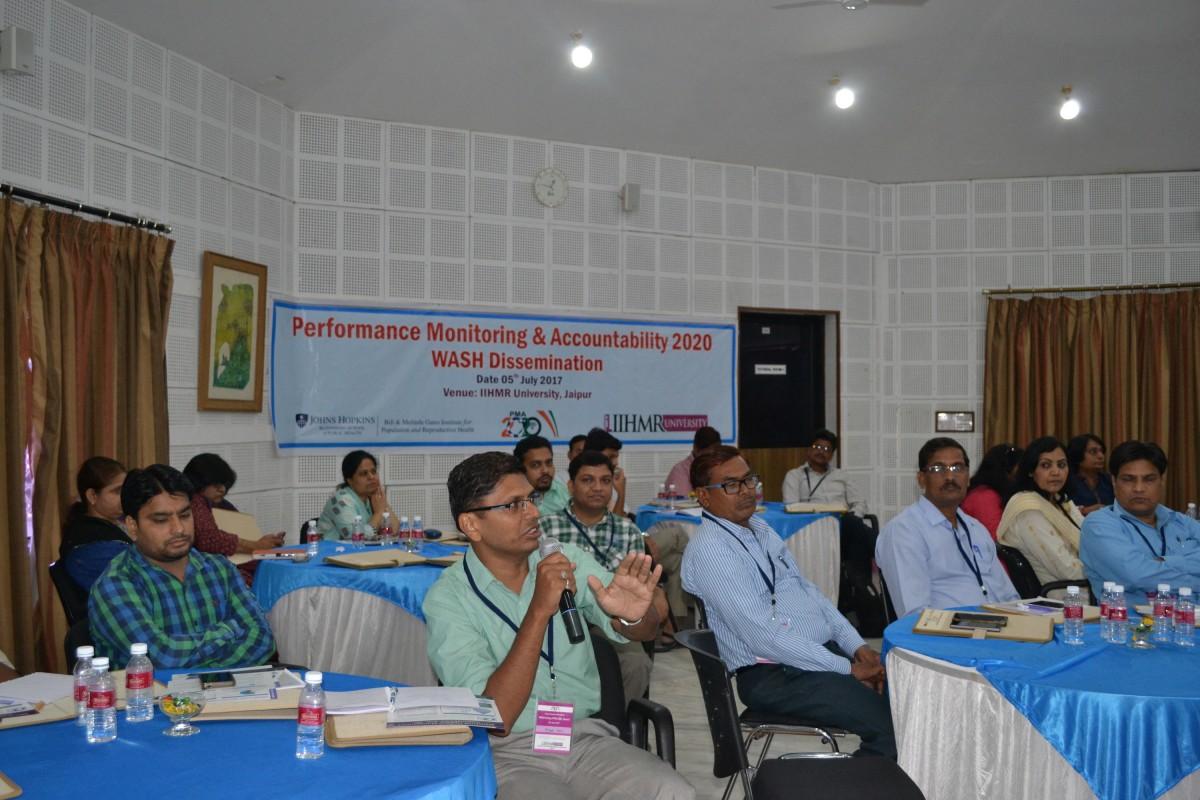On July 5, 2017, the Performance Monitoring and Accountability 2020 (PMA2020) Rajasthan team hosted the first-ever dissemination of their Round 2 water, sanitation and hygiene (WASH) and menstrual hygiene management (MHM) data at the Indian Institute of Health Management Research University (IIHMRU) in Jaipur. IIHMRU, the lead implementing partner for the PMA2020 program in Rajasthan, convened a diverse group of stakeholders in the WASH sector with an estimated 45 representatives from local government, various non-profit and development organizations and faculty members from IIHMRU and Tata Institute of Social Sciences (TISS).
The event began with remarks from PMA2020 Rajasthan’s Principal Investigator, Dr. Anoop Khanna and a special welcome from Mr. Anil Kumar Jain, Superintending Engineer for Ajmer SMART City and Dr. Goutam Sadhu, IIHMR faculty member and WASH expert. During an open question and answer session that preceded the presentation, participants expressed their excitement at the availability of the PMA2020 WASH data, particularly on open defecation and MHM, and their interest in tracking progress over continued rounds of the survey in Rajasthan.
 The PMA2020 WASH survey data monitors WHO/UNICEF’s Joint Monitoring Programme defined indicators of access to improved water and sanitation, and also includes specialized questions for measuring water availability and reliability, use of regular (secondary) water sources, open defecation at the population level and child feces management.
The PMA2020 WASH survey data monitors WHO/UNICEF’s Joint Monitoring Programme defined indicators of access to improved water and sanitation, and also includes specialized questions for measuring water availability and reliability, use of regular (secondary) water sources, open defecation at the population level and child feces management.
These data are especially relevant to the ongoing Swachh Bharat Mission and has been able to track a decrease in open defecation as the main household practice from 63% of rural households in 2016 to 54% in 2017. The Swachh Bharat Mission, or the Clean India Movement, a campaign by the Government of I2ndia has the goal of reducing or eliminating open defecation in the country. These results can also help track the United Nations Sustainable Development Goal (SDG) target 6.2.1 on sanitation chain monitoring, among others.
 The PMA2020 MHM data, which tracks state-level MHM indicators, is the first of its kind anywhere in India. Findings show that more than one-third of women in Rajasthan use the backyard or bush as the main place for changing menstrual materials, and only about half have access to soap and water for cleaning their materials and bodies. Continued tracking of progress on MHM in India is critical not only for the Swachh Bharat Mission, but also for advancing key areas of the SDG agenda including health, education, and gender equality.
The PMA2020 MHM data, which tracks state-level MHM indicators, is the first of its kind anywhere in India. Findings show that more than one-third of women in Rajasthan use the backyard or bush as the main place for changing menstrual materials, and only about half have access to soap and water for cleaning their materials and bodies. Continued tracking of progress on MHM in India is critical not only for the Swachh Bharat Mission, but also for advancing key areas of the SDG agenda including health, education, and gender equality.
PMA2020 uses mobile technology and local networks of female data collectors to facilitate rapid-turnaround surveys in 11 countries in Africa and Asia, enabling the tracking of data on WASH and MHM, among other global health and development indicators.
The third round of data collection for PMA2020 Rajasthan will be starting up next month.
For more information on the results, download the Rajasthan WASH brief and the MHM brief, available in both English and Hindi.
